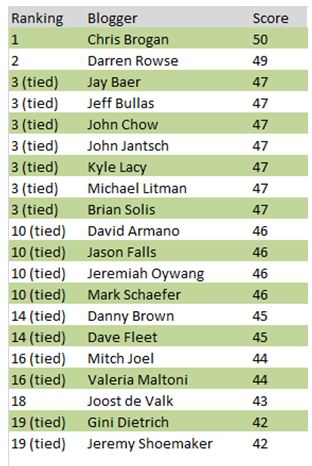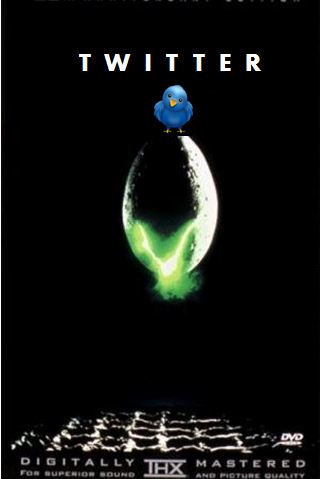I had the strangest call from Charlie Sheen yesterday.
“OK man, I’ve got 2 MILLION freaking people following me on Twitter and my Klout score still sucks. Ya gotta help me!”
“Charlie,” I calmly replied, “Klout scores really don’t tell you much of anything. Don’t worry about it.”
“But Mark,” he stammered, “This is all about WINNING my friend. And I am NOT WINNING if I have a Klout score lower than you. That is just pathetic. My tiger blood is raging here. What do I do???”
Sadly, this type of celebrity Twitter rant has become (yawn) routine for me. And every bit of that conversation is absolutely true, except the part about Charlie Sheen calling me.
Well, I do get requests from folks asking for Twitter help every day … usually to re-tweet a notable blog post or perhaps in support of a charity. I’m glad to help where I can but I’ll let you in on a little secret: It doesn’t work.
Some people look at the number of followers I have and a relatively high Klout score and imagine that I can be their gateway to social influence. I’ve been around long enough to know that these factors do not translate into influence at all. Even when I ask people to take action on something I really believe in, typically very little action occurs. This is not a matter of being humble or gracious. It is simply the truth. When I tweet something, it rarely results in tangible action.
Sorry, there is little true influence on Twitter
This phenomenon was also noted in Tom Webster’s fine Brand Savant blog. (It seems like I am quoting him a lot lately!) In an extraordinary measure, he personally contacted every Klout-infested A-list blogger he could think of to help him with a New Zealand earthquake charity appeal.
Tom calculated that the “reach” of his message easily exceeding 600,000. Out of that number, his appeal received 389 clicks and 10 submissions to his cause. Tom admits there were some complications that could have depressed the number but he pithily states that this conversion rate — compliments of some of the world’s greatest Twitter “influencers” — was significantly lower than what would be expected from a random pop-up ad.
In a post on the Networked Nature of Twitter by Megan Garber, she reported that actress Alyssa Milano — with a Klout score of 84 — sent out a tweet to her nearly 1.2 million followers: a link to the Amazon page of a book called Connected: The Surprising Power of Our Social Networks & How They Shape Our Lives.
Can you imagine the influence of a tweet from one of Twitter’s biggest stars? Wouldn’t that really help the author’s career?! Well, the impact was zero. Literally zero. Not one additional book sale resulted from the tweet.
I’ve also had my blog posts tweeted by Alyssa and other Twitterati, and while it definitely sends a short-term spike in page views, it has never resulted in any measurable difference in new blog subscribers. In fact, after Guy Kawasaki tweeted my post five times in 24 hours, my blog reader subscriptions went down.
For those swooning over Twitter-derived influence scores like Klout, this should be a wake-up call. It’s true. On Twitter, no one can hear you scream.
But blogs are another matter …
Marketers should be looking for influence in blog communities. That is where the real magic is happening. Tom Webster made an insightful point in his post — The people who finally took action on his request were strong connections nurtured through his blog-oriented relationships.
I have had the same experience. I KNOW I can move my blog community to action and they can move me to action, too. The connections built through a blog community are extremely strong compared to the weak ties on Twitter.
Curiously, blog activity is not accounted for on most of the popular social scoring measures. In fact, Klout is only looking at those weak Twitter ties right now. One measure that seems to at least take a crack at blog influence is Post Rank. Post Rank is one of the milestones used by AdAge to rate the world’s marketing blogs. What does it really measure? Nobody knows for sure … it is certainly an amalgam of tweets, comments and other forms of online engagement taking place between the blogger and the community. I actually hired a CPA to try to de-tangle the formula for this article and she couldn’t do it!
Nevertheless, if you buy into the notion that blogs nurture strong connections that lead to influence, wouldn’t this elevate a measure like Top Rank ahead of something like Klout?
 I think REAL influence is taking place in the smaller, stronger groups found in passionate blog communities. I plucked out the top-rated bloggers via Post Rank and yeah, these people certainly exhibit thought leadership and influence on their communities and beyond.
I think REAL influence is taking place in the smaller, stronger groups found in passionate blog communities. I plucked out the top-rated bloggers via Post Rank and yeah, these people certainly exhibit thought leadership and influence on their communities and beyond.
By explanation — most blogs on the AdAge Power 150 are run by companies, have a staff of bloggers, or aggregated content. I left them off. So while Brian Clark is most associated with Copyblogger, his name is left off because the site is populated by a staff of writers.
Another observation as I looked at this list — there were a few names I did not recognize. How do those names stack up for you?
Any way, something to think about. Does this make sense to you? Are you forming strong ties in blog communities, on Twitter, Facebook or elsewhere? What form of online engagement influences YOU?



